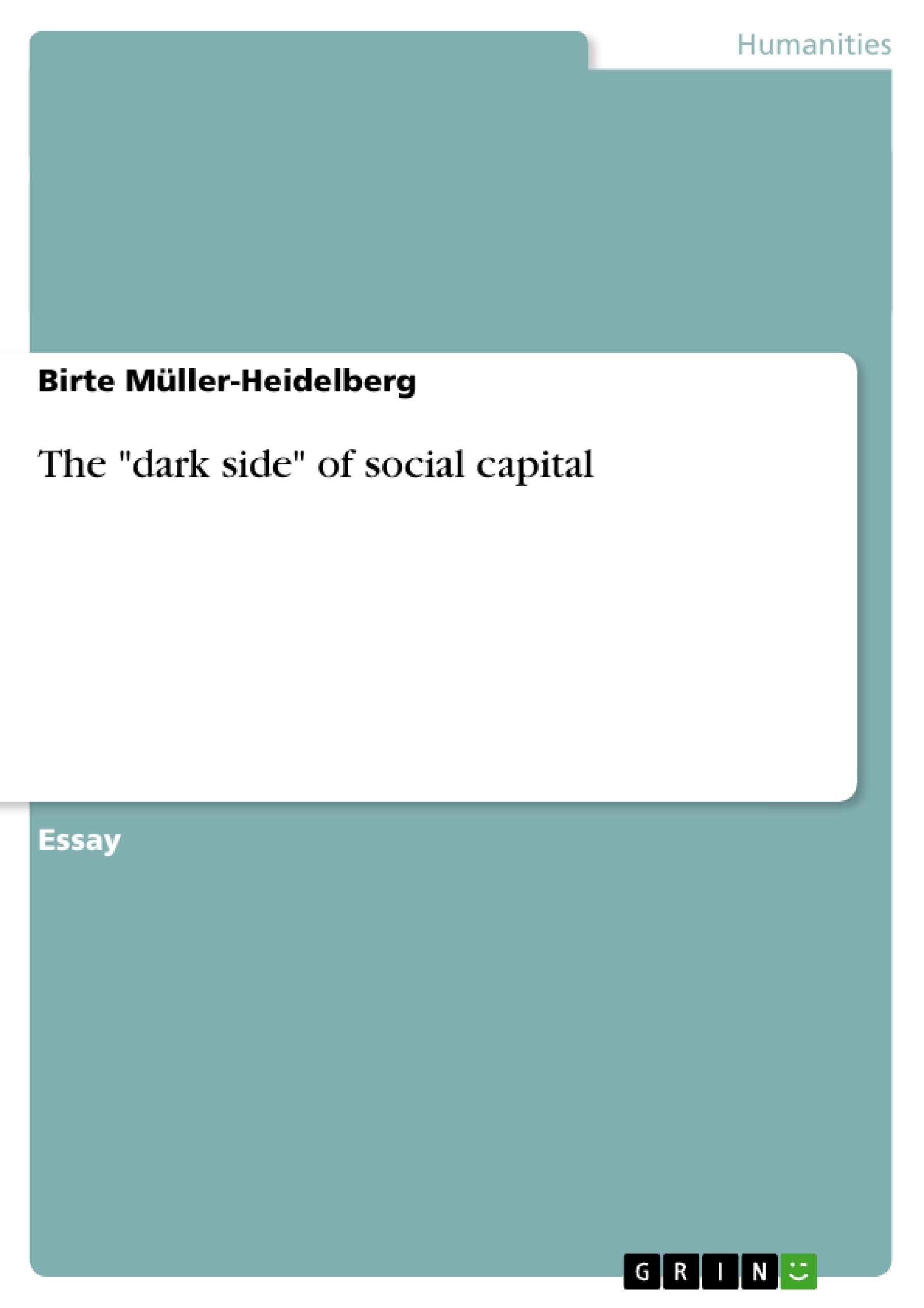Excerpt
Table of Contents
1. Introduction
2. The rules of the game – Trust and networks
2.1 Trust
2.2 Networks
3. The vicious cycle of exclusion – Social capital’s dark side for individuals
3.1 Networks
3.2 Trust
3.3 Rules and norms
4. Blind trust and perverse networks – Social capital’s negative impacts on the state
4.1 Trust
4.2 Networks
4.3 Rules and norms
5. Conclusion
Bibliography
Social Capital
“Such things as trust, the willingness and capacity to cooperate and coordinate,
the habit of contributing to a common effort even when noone is watching […].”[1]
1. Introduction
The idea of social capital that developed in sociology has in recent years spread all over the disciplines and become more influential in politics and economics as well. It is known to make economy flourish and increase the democratic performance of a state. Social bonds lower the costs of working together, social capital facilitates co-operation. People have the confidence to invest in collective activities, knowing that others will also do so. With the rising interest in social capital, the concept has almost been canonised. Social capital and the idea of civil society emerging from it often appear as the cure-all to every single one of our problems.
The “features of social organisation, such as trust, norms, and networks, that can improve the efficiency of society by facilitating coordinated actions”[2] is how Putnam defines social capital; and indeed, those factors seem very appealing. But a dense concept of relations and trust, connectedness, networks and groups, the belief in reciprocity and exchanges, common rules, norms and sanctions[3] is not entirely positive and harmless and therefore should not be embraced unquestioned. As every other concept, social capital as well is a two edged sword. “Relationships matter”[4], is how Field summarizes the central thesis of the theory. And she is right. This essay tries to show that in fact a whole range of different kinds of relationships do exist in society, and that not all of them have a positive impact on the ‘common good’.
2. The rules of the game – Trust and networks
2.1 Trust
The basis of all social capital is trust. Trust is considered as being able to predict another persons actions. “When we say we trust someone or that someone is trustworthy, we implicitly mean that the probability that he will perform an action that is beneficial or at least not detrimental to us is high enough for us to consider engaging in some form of cooperation with him.”[5] Only if we trust in other people, in the state, in regulations and norms, we can contribute to a civil society without having to fear exploitation and unfair or unevenly distributed workloads or risks. Trust can be defined as general trust in people, trust in the exchange of favours and trust in the obedience of others in the same rules as those to which we obey ourselves.
General trust in people reduces the transaction costs between them. Instead of having to invest in monitoring others, individuals are able to trust them to act as expected. This saves money and time. There are two types of trust: the trust we have in individuals whom we know; and the trust we have in those we do not know, but which arises because of our confidence in a known social structure.
Another form of trust is the one in reciprocity and exchanges. The belief that someone in exchange returns a favour done to him before makes it much more likely that people help each other out. Specific reciprocity refers to simultaneous exchanges of items of roughly equal value, a kind of monetary system like the idea of so-called “time banks” that has emerged in the United States of America during the 1980s. Diffuse reciprocity on the other hand refers to a continuing relationship of exchange that at any given time may be unrequited, but over time is repaid and balanced. Comparing the idea of diffuse reciprocity with features from a monetary system could be done through the concept of IOUs or cheques. This contributes to the development of long-term obligations between people which constitute the system of a civil society.
The trust in rules, norms and sanctions gives individuals the confidence to invest in collective or group activities, knowing that others will do so too. Rules therefore place group interest above that of individuals. Mutually-agreed sanctions ensure that those who break the rules know they will be punished. Coleman calls these rules the internal morality of a social system[6] ; Elster even describes them as the cement of society.[7]
Summarizing all these different forms of trust, Coleman concludes that “[…] a group within which there is extensive trustworthiness and extensive trust is able to accomplish much more than a comparable group without that trustworthiness and trust.”[8]
2.2 Networks
The second main aspect of a well functioning society based on the idea of social capital is the existence of close networks, “the structure of relations between actors and among actors”[9] that encourages productive activities. Social capital implies high organisational density and cross-organisational links. Bourdieu therefore defines social capital as “what ordinary language calls ‘connections’.”[10] In general, two-way relationships are better than one-way; and linkages subject to regular update are generally better than historically-embedded ones. These networks rely mainly on information sharing, the coordination of activities and collective decision-making. But, as Coleman pointed out (and others, like Elinor Ostrom, followed him): “Social capital can have a dark side.”[11]
[...]
[1] Solow, 2000, 7
[2] Putnam, 1993, 169
[3] central aspects of social capital as identified by Pretty/Ward, 2001
[4] Field, 1996, 1
[5] Gambetta, 1988, 217
[6] Coleman, 1990
[7] Elster, 1989
[8] Coleman, 1988/2000, 19
[9] Coleman, 1990
[10] Bourdieu, 1984/1993, 32
[11] Levi, 1996, 52
- Quote paper
- Birte Müller-Heidelberg (Author), 2003, The "dark side" of social capital, Munich, GRIN Verlag, https://www.grin.com/document/19652
Publish now - it's free























Comments